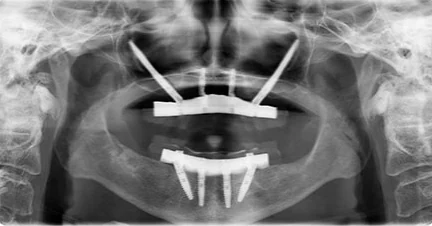Zygomatic Implants: A Game-Changer for Those with Severe Bone Loss
Zygomatic Implants: A Game-Changer for Those with Severe Bone Loss
By Dr. Omar, Lumos Dental Care & Implant Center
Understanding Zygomatic Implants
Zygomatic dental implants, also known as zygoma implants, are a revolutionary solution for patients with significant bone loss in the upper jaw. Unlike traditional dental implants that are anchored into the jawbone, zygomatic implants are anchored into the zygomatic bone, or cheekbone, providing a stable foundation for dental restorations without the need for bone grafting.
What are Zygomatic Dental Implants?
Zygomatic implants are designed to support a full arch of teeth for patients who lack sufficient upper jaw bone to support conventional implants. These implants are longer than traditional ones, typically ranging from 35mm to 55mm, and are placed at a 45-degree angle to maximize support and stability.
The Zygomatic Implant Procedure
The placement of zygomatic implants is typically performed under general anesthesia by a team that includes a prosthodontist and an oral and maxillofacial surgeon. The procedure begins with a thorough evaluation of the patient’s dental and medical history, along with a CT scan of the jawbone and maxillary sinus.
The surgical process involves creating a small incision in the gum tissue to prepare the zygomatic bone for the implant. The implant is then carefully positioned and secured. Following placement, a temporary denture is attached to allow for healing and osseointegration—the process by which the implant fuses to the bone. Once integration is complete, the temporary denture is replaced with a permanent set of teeth.
Benefits of Zygomatic Implants
1. Increased Stability: Zygomatic implants provide a robust foundation for dental restorations, particularly in cases where traditional implants are not viable due to bone loss. They are ideal for supporting All-on-4 implant solutions.
2. Improved Aesthetics: These implants offer a natural-looking solution for patients with missing teeth, enhancing their appearance and self-confidence.
3. Reduced Treatment Time: Zygomatic implants allow for immediate loading, meaning patients can receive a full set of teeth in one procedure, reducing overall treatment time and the number of dental visits.
4. Enhanced Quality of Life: Patients with zygomatic implants can eat, speak, and smile with confidence, significantly improving their overall quality of life.
Zygomatic Implants vs. Conventional Implants
The primary difference between zygomatic and conventional dental implants is the anchorage. Zygomatic implants are anchored in the cheekbone, while conventional implants are placed in the jawbone. This makes zygomatic implants an excellent option for patients with significant bone loss who would otherwise require bone grafting for traditional implants.
Ideal Candidates for Zygomatic Implants
Patients with severe bone loss in the upper jaw, often due to prolonged denture use or tooth loss, are ideal candidates for zygomatic implants. The procedure is particularly beneficial for those whose sinus spaces have expanded, further weakening the jawbone.
No Need for Bone Grafting
A significant advantage of zygomatic implants is that they eliminate the need for bone grafting. Traditional implants require sufficient healthy bone in the jaw, but zygomatic implants, anchored in the denser zygomatic bone, provide excellent stability even in patients with severe bone loss.
Success Rates and Longevity
Zygomatic implants are known for their durability and high success rates. Studies have shown a survival rate of 95.5% after five years and 91.6% after ten years. With proper care, including good oral hygiene and regular dental check-ups, zygomatic implants can last for many years.
Disadvantages to Consider
While zygomatic implants offer many benefits, there are some potential drawbacks:
Complexity: The procedure is complex and requires a highly skilled and experienced dental professional.
Cost: Zygomatic implants can be more expensive than traditional implants due to the complexity and specialized equipment involved.
Recovery Time: There is still a recovery period, and patients may experience discomfort, swelling, and bruising.
Potential Complications: Risks include infection, implant failure, nerve damage, and sinus issues.
Conclusion: Are Zygomatic Implants Right for You?
Zygomatic implants are a viable option for patients with severe bone loss in the upper jaw, offering increased stability, improved aesthetics, and a faster treatment journey. To determine if zygomatic implants are the right solution for you, consult with an experienced dental professional who can provide personalized advice based on your individual needs. At Lumos Dental Care & Implant Center, our specialist prosthodontist team with Dr. Omar, ensures the procedure is safe and effective, helping you achieve a natural-looking, functional smile.

AUTHOR : PROF. DR. OMAR SHARFUDDIN
Email: dr.omar@lumosdentalcare.com


nice article
I consider, Its a good article. Let’s discuss more. Write to me in PM.
thank you
good job